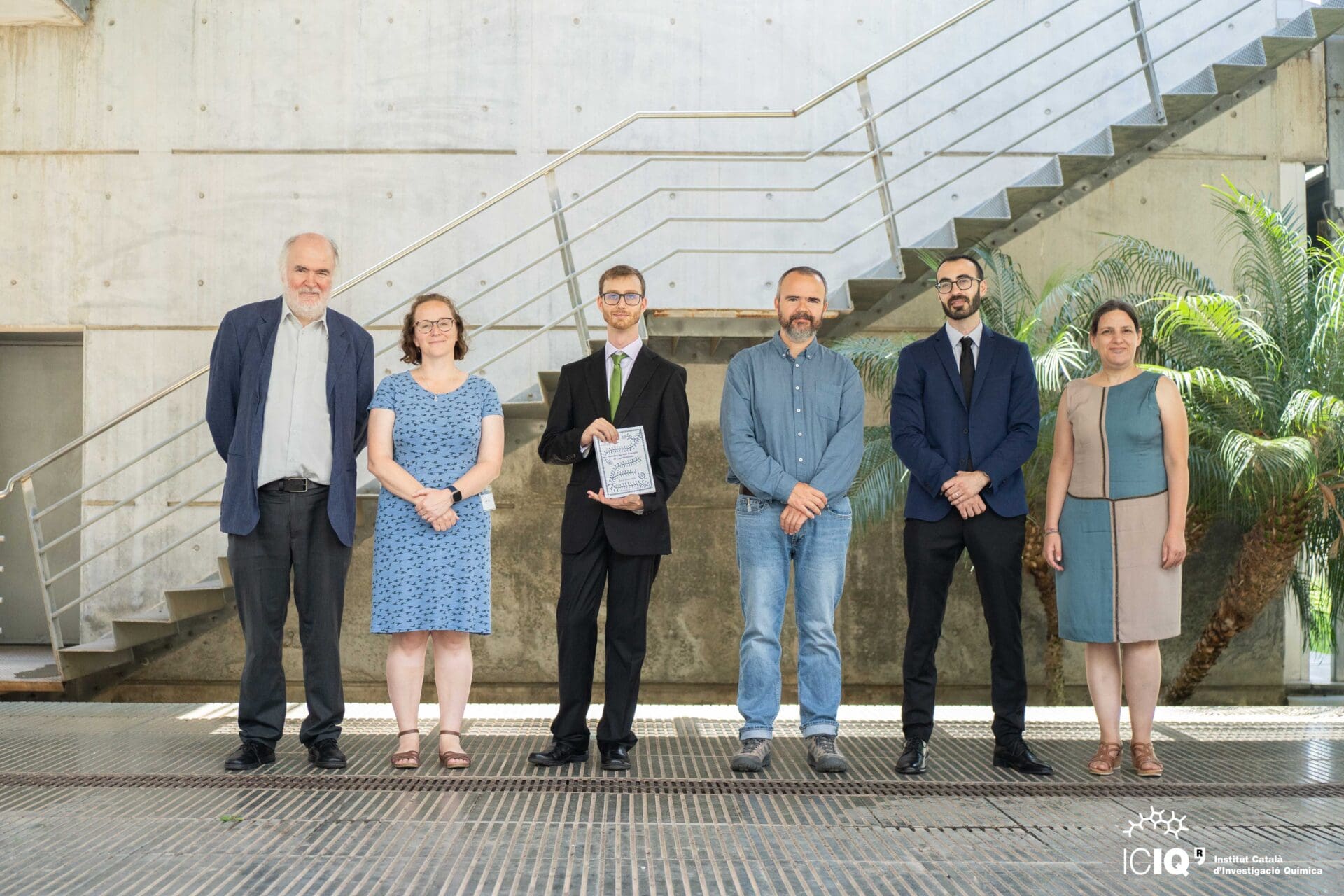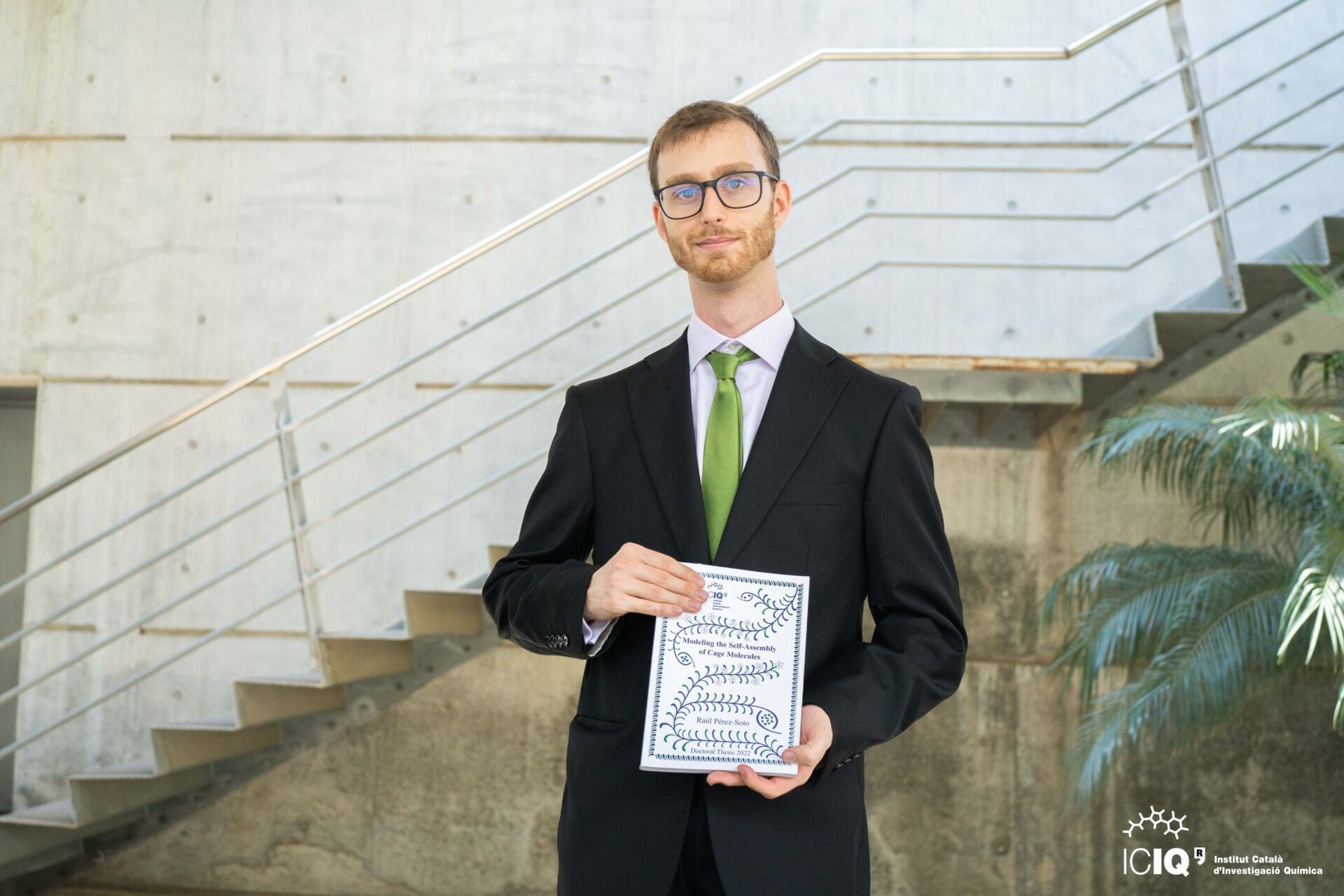Hats off to Dr. Pérez-Soto!
Raúl Pérez Soto, PhD student under the supervision of Prof. Feliu Maseras (ICIQ) and Dr. Maria Besora (URV), has defended his PhD thesis entitled “Modeling the Self-Assembly of Cage Molecules” (assigned to the Inorganic and Physical Chemistry Department of the Universitat Rovira i Virgili) publicly on July 29th.
The members of the evaluation committee were: Prof. David Balcells (Hylleraas Centre for Quantum Molecular Sciences, Norway), Dr. Juan V. Alegre-Requena (Universidad de Zaragoza), and Prof. Kim Jelfs (Imperial College London)

Dr. Pérez with his supervisors, Prof. Maseras and Dr. Besora and the members of the evaluation committee
Dr. Pérez-Soto is from Granada. He studied Chemical Engineering at Universidad de Granada, during this time he took advantage of his summers by doing placements at different research centres, such as CIQUS and IMDEA Materials. Once graduated he worked for six months in the group of Dr. Haranczyk at IMDEA Materials before joining the URV-ICIQ joint Master in Synthesis, Catalysis and Molecular Design in 2017. In 2018 he joined the Maseras group, where he worked as a PhD student thanks to an FPU grant. Outside the lab, he likes playing volleyball and video games (which was a life-saver during the lockdown). He likes learning new things, from more work-related topics such as programming to completely alien topics such as psychology, doing so by reading books and attending to MOOCs.
What is your thesis about?
I have worked to understand the self-assembly of supramolecular boxes aiming to find which pathways the monomers follow during the synthesis of a cage molecule. This process depends on the characteristics of the monomers, like their shape or chemical motives. I’ve modelled and simulated the complex network of reactions involved in the self-assembly and derived a general mechanism.
Why did you decide to pursue this project?
I got interested in this subject because it’s something that is required for future industrial manufacture. When doing large-scale synthesis, you need a wide knowledge of how to control the outcome of a reaction, for which knowing the mechanism of the reaction is key. Therefore, and since I believe these types of molecular containers will be used on a large scale, I decided to delve into their self-assembly mechanisms to help speed up their large-scale production.
What did you like the most about your thesis?
From an aesthetic point of view, the geometries of the molecular boxes are mesmerizing. But that is not what I would highlight, the thing I like the most is that I was given complete freedom to develop the project that I wanted – and it worked out!
Do you have a goal as a scientist?
I’m interested in doing things that are useful, and that people can benefit from.
From the skills learnt, which one do you value the most?
I haven’t learnt it, but it’s the one I value most: knowing when to stop. Sometimes, it doesn’t make sense to keep on pushing and trying to achieve something, it’s better to take a step back and re-evaluate if it’s worth it.
What ICIQ moment you’ll never forget?
Every time we went for a calçotada or celebrated Christmas with the computational groups. We have a great dynamic and enjoy our time together.
I like science because… Each new project is a new puzzle to solve.
Do you have a favourite molecule? The CC1 imine cage has occupied my mind for the last four years… so I have a love-hate relationship with it.
What’s next?
I’m aiming for a postdoc position in the USA, where I hope to improve my knowledge of machine learning. For now, I am happy that it seems like it will become a reality.
If you were to become a piece of equipment, what would you be?
A computer, because it sometimes seems they take forever to do a task (like calculations) but in the end, they always complete it.
Related news

Let's create a brighter future
Join our team to work with renowned researchers, tackle groundbreaking
projects and contribute to meaningful scientific advancements







 20-12-2024
20-12-2024 


















